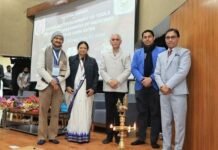New Delhi, Mar 12: Terming India a haven of macroeconomic stability, Prime Minister Narendra Modi Saturday vowed to continue ‘reform-to-transform’ process and pursue policies that will enhance growth and further inclusion. India’s rapid economic growth that is now the fastest among big economies in the world is very distinct in Asia, he said.
“We have never tried to gain in trade at the expense of our partners. We do not follow ‘beggar thy neighbour’ macroeconomic policies. We have never undervalued our exchange rate,” he said addressing a conference on Advancing Asia, co-hosted by India and IMF here. Modi said India is a “haven of macroeconomic stability and a beacon of hope, dynamism and opportunity” amid global problems and has dispelled the myth that democracy and rapid economic growth cannot go together.
“India has also shown that a large, diverse country can be managed in a way that can promote economic growth and maintain social stability,” said. Listing achievements in macroeconomic stability, he said there has been a durable reduction in inflation, steady fiscal consolidation, a comfortable balance of payments position and build-up of foreign exchange reserves. In a difficult external environment and despite a second successive year of weak rainfall, India’s growth rate increased to 7.6 per cent, the highest among major economies.
“All of us need to pursue policies that provide a stable macroeconomy, enhance growth and further inclusion,” he said. Stating that economic governance has improved, he said corruption and interference in the decisions of banks and regulators are now behind us. “We do not intend to rest on these achievements because my agenda of ‘reform-to-transform’ still needs to be finished,” he said. Modi said Budget 2016-17 provides a roadmap for future plans and ambitions.
“Our underlying philosophy is clear: To create the climate for wealth generation and for that wealth to be spread to all Indians, especially the poor, vulnerable, farmers, and disadvantaged communities,” he said.



























